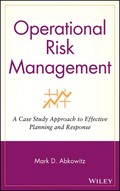 For several years now Mark Abkowitz’s book “Operational Risk Management” has been sitting on my “to-read” shelf. Given my recent wish for a case study approach to leadership and given the Fukushima nuclear issues, the book caught my attention.
For several years now Mark Abkowitz’s book “Operational Risk Management” has been sitting on my “to-read” shelf. Given my recent wish for a case study approach to leadership and given the Fukushima nuclear issues, the book caught my attention.
Books that analyse disasters are far superior to watching real-time disasters because the distress is minimised, the analysis can be dispassionate and time can provide a more detailed context. (The quickness of production of some of the books about the BP/Gulf of Mexico suffered from the curse of topicality) Books provide a distance that the constant exposure to “disaster porn” does not.
Operational Risk Management looks at many at many disasters from the last 30 years but the disasters are not only industrial and process disasters, although Chernobyl and Bhopal are covered. The inclusion of the attack on the USS Cole, various terrorist attacks in the US and abroad, and short discussions on tsunamis and hurricanes show that the assessment of risks and the management of disasters are human managerial processes, principally, and, usually, unrelated to the industry or geography in which they occur.
It is necessary to have around 18 chapters of disasters to provide the background to the chapter with the greatest use – Lessons Learned. Below are some of the lessons that Abkowitz identified that
“… we can learn and apply toward making our future world a safer place.”
- “Risk factors work together to generate an event with disastrous consequences.
- Communication failure is a risk factor in every disaster, irrespective of whether the even is caused by accident, intentional act, or nature.
- Take planned and preparedness seriously: it should never be short-changed.
- Arrogance among individuals and organizations is perhaps a far more significant risk than previously imagined.
- It usually takes a disastrous event to convince people that something needs to be done”
Some of these lessons will be very obvious to safety professionals but the “arrogance” reference was particularly interesting as rarely do human emotions get mentioned. When they do they are often couched in less inflammatory terms hoping that the reader reads between the lines. To some extent, arrogance could be equated to the “taking of shortcuts” that is often raised in OHS investigations. Some shortcuts result from work pressures but we should not ignore those caused by arrogance which, in some court, cases is the basis for negligence.
Abkowitz could update this book each year with new case studies that further illustrate the lessons he lists but this would not add new lessons, only provide more evidence for the existing lessons. Sadly, it is reasonable to describe this book as timeless because the disasters continue to occur and the lessons keep needing to be learned.

Thank goodness some bloggers can write. Thanks for this piece..
Forgive me if i sound – i dont know – but, reading about disasters will not help. You can be as safe as you want. But to me a disaster is an unpredictable event.
On 7 August 1994 Moura underground mine sufferred a methane gas explosion and 11 men were entombed in the mine. Andrew Hopkins wrote a book called Managing Major Hazards about Moura that I reckon is essential reading for safety people, supervisors and managers in all industries, not just mining.
There was a massive investigation effort and people said lessons were learnt.
The recent coal mine tradegy in New Zealand had a lot in common with Moura and I thought the Moura lessons had not been learnt in N.Z.
George
It is a very good early-Hopkins book. In some ways it is easier to read than his later books concerning mindfulness. My understanding is that it is out-of-print but some of the content is available at Google Books
Kevin